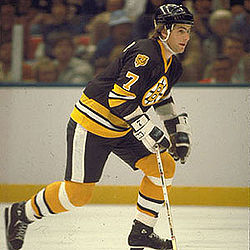History of the National Hockey League/1967–1992/Twenty-one teams

The merger brought Gordie Howe back to the NHL for one final season in 1979–80. At age 51, Howe played all 80 games for the Whalers, scoring 15 goals to bring his NHL career total to 801. He entered his second retirement as the league's all-time scoring leader with 1,850 points. Howe's final season was also the last for the Atlanta Flames. The team averaged an attendance of only 9,800 fans per game and lost over $2 million in 1979–80. They were sold for a record $16 million, and relocated north to become the Calgary Flames in 1980–81. Two years later, the Rockies were sold for $30 million, and left Denver to become the New Jersey Devils for the 1982–83 season.
The St. Louis Blues nearly relocated to Saskatoon in 1983, as Bill Hunter, an original investor in the WHA, announced an intention to purchase and relocate the team. Hunter quickly convinced 18,000 people to commit to season tickets in a proposed arena for the city. The other team owners rejected the sale and relocation by a 15–3 vote, prompting the Blues' owner, Ralston Purina, to file a $60 million anti-trust lawsuit against the league. Both the league as a whole and the individual teams filed $78 million counter suits against Purina. As part of the conflict, Purina turned the team over to the NHL at the beginning of June 1983 to "operate, sell or dispose of in whatever manner the league desires", while the Blues refused to participate in the 1983 NHL Entry Draft, forfeiting all of their draft picks. By the end of July, the league had sold the team to Harry Ornest, who vowed the team would remain in St. Louis. Ralston Purina and the NHL settled their legal issues in 1985, though terms of the settlements were not released.
In 1980, the New York Islanders won their first of four consecutive Stanley Cups. With the likes of Billy Smith, Mike Bossy, Denis Potvin, and Bryan Trottier, the Islanders dominated both the regular season and the playoffs. In 1981, Bossy became the first player to score 50 goals in 50 games since Maurice Richard in 1945. In 1982–83, the Edmonton Oilers won the regular season championship. The Islanders and Oilers met in the Finals and New York swept Edmonton for their last Stanley Cup. They were the second franchise to do win four straight championships, after the Canadiens.
The following season, the Oilers and Islanders met again in the playoffs. The Oilers won the rematch in five games, marking the start of another dynasty. Led by Wayne Gretzky and Mark Messier, the Oilers won five Stanley Cup championships between 1984 and 1990. The Oilers won two consecutive Cups in the 1983–84 and 1984–85 seasons, and in the 1986–87 and 1987–88 seasons. They also won a Cup in the 1989–90 season. The Oilers' Cup streaks were interrupted in the 1985–86 and 1988–89 seasons by two other Canadian teams. Edmonton's hopes for a third consecutive title in 1986 were dashed by their provincial rival, the Calgary Flames, after Oilers' rookie Steve Smith accidentally bounced the series-winning goal off goaltender Grant Fuhr and into his own net. Smith's error remains one of the most legendary blunders in hockey history. The Flames were defeated by the Canadiens in the finals, as rookie goaltender Patrick Roy led Montreal to their 23rd Stanley Cup. The 1989 final was a rematch between the Flames and the Canadiens and was won by Calgary, which captured its only championship in franchise history.
The 21-team era ended in 1990, when the league revealed ambitious plans to double league revenues from $400 million within a decade and bring the NHL to 28 franchises during that period. The NHL quickly announced three new teams: The San Jose Sharks, who began play in the 1991–92 season, and the Ottawa Senators and Tampa Bay Lightning, who followed a year later.
